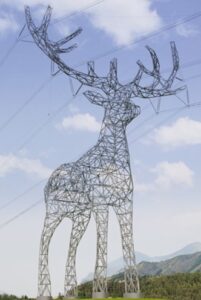Nationalism usurps climate, the emotions of climate change and should we follow Sydney?
In this issue:
What is it?
Answer at bottom of page
Energy nationalism pushing climate ambitions aside
A new report from Siemens titled the Infrastructure Transition Monitor 2025 tells us energy resilience and independence has overtaken climate cooperation as the key driver of the energy transition for governments and large corporates over the last two years. 62% of the 1,400 respondents believe future energy systems will rely more on local production than global trade. This shift of emphasis is also reflected in a fall in confidence of achieving climate goals. 57% of respondents expect increased investment in fossil fuels over the next two years and 37% believe they will meet 2030 targets, down from 44% at the last survey, two years ago.
Methane warnings start to make a difference
Some good and bad news on methane emissions has emerged out of the UN recently. The satellite-based Methane Alert and Tracking System (MARS) was introduced in 2022 to alert oil and gas companies to unintentional leaks. The good news is the number of alerts that provoked action increased from 1% last year to 12%. The bad news is it is still only 12%. With methane emissions accounting for a third of global warming, it would be good to see that figure climb markedly again next year.
How our reactions differ
GlobeScan has just published a report on how people’s reactions to climate change issues differ around the world. The findings reveal quite a difference by region with the Global South tending to be more optimistic. There is a general preference for systemic change rather than personal sacrifices and we also see evidence of growing climate fatigue. Climate change came in 7th on a list of global problems, which was headed by concerns over war, cancer, corruption and poverty. New Zealand was not one of the 33 countries surveyed.
Sydney to ban gas for new buildings
The City of Sydney Council has just passed a bill to ban gas installations in new buildings. Internal, domestic gas appliances in new homes were outlawed earlier this year but this latest move extends the prohibition to outdoor appliances and medium and large commercial buildings, including hotels and serviced apartments. Barbecues powered with bottled gas are not included in the appliance ban, so it is not all good news for the local shrimps.
2,300 mega-projects added to fossil fuel pipeline
That’s the conclusion of research from Carbon Bombs which claims that number of projects, made up of new oil, gas and coal extraction sites and LNG terminals have been added to plans since 2021, the year in which the IEA recommended a halt to fossil fuel expansion. Two projects are listed for NZ, Mangahewa and the South Taranaki Energy Project.
Another finance sector initiative backtracking
Following on from the recent news about the collapse of the Net Zero Banking Alliance, this week the Net Zero Asset Managers initiative downgraded expectations of its members. While its updated commitment statement still requires members to hold the global temperature increase on pre-industrial levels to well below 2C, they now only need to “recognise the importance” of decarbonising to achieve this and no longer need to prepare strategies aligned with the target. The updated commitment also lacks the requirement to achieve net zero by 2050 at the latest, a critical component of the original.
What is it solution
Of course, the wires give it away. It is one of the new, nature-inspired pylons popping up across Austria with each of its nine states having a symbolic animal. The stag can be found in the state of Lower Austria which, strangely, is in the north east of the country. For those interested in trivia, the naming is a throwback to Austrian history where the country was split into Upper and Lower regions by the river Enns.



